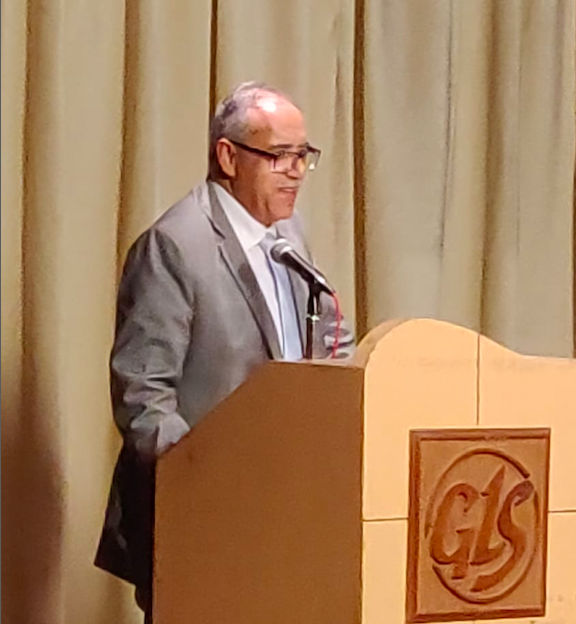Holding up an incident from the life of Guru Nanak, Justice Deepak Gupta, Judge of Supreme Court brought out the irony and the fear of the Sedition Law, and how it was being applied in the country today
On a pilgrimage to Haridwar, the story goes, Guru Nanak was amused at finding pilgrims raising water from the holy Ganga river and dropping it to the Sun as an offering to their ancestors. He did the opposite. Turning his back to the Sun, the rationalist Guru starting offering water in the westward direction.
Outraged priests asked what was he was doing?
“My crops are dying of lack of water and I’m watering them,” replied Guru Nanak.
Everybody burst out laughing and made fun of him. “How would this water reach your fields hundreds of miles away,” they drilled it into him.
He responded, “if water poured to the Sun can reach your ancestors in another world, certainly the water I pour could reach my fields.”
Narrating the story from Guru Nanak Dev’s life at a valedictory address on Saturday at Ahmedabad on ‘Law of Sedition in India and Freedom of Expression’ Justice Gupta observed, “Today if somebody was to behave like Guru Nanak, most probably he would have to spend a couple of days in jail.”
“The British brooked no opposition and did not want to listen to any criticism,” is the legacy of Sedition Law introduced into the country by a foreign imperialist colonizing power with the sole aim of depriving the people of their rights, including the rights to express their views was how the learned judge put the controversial law into its historical context.
Soon after the Sedition Law was established by insertion of Section 124A into the IPC in the year 1898, it was used it curb the demand for Independence in the Queen Empress Vs Balagangadhar Tilak (Lokmanaya Tilak as the great freedom fighter was know as), case contested at Bombay in the same year.
Slapped with sedition charges Mahatma Gandhi, while appearing before the Ahmedabad sessions judge Broomfield had contested, “Affection cannot be manufactured or regulated by law. If one has no affection for a person or a system, one should be free to give the fullest expression to his disaffection, so long as he does not contemplate, promote or incite to violence.”
Where Mahatma Gandhi’s plea had failed to move the judge who sentenced him to 6 years of imprisonment, Justice Gupta, who hails from Shimla said, “You cannot force people to have affection for the government and merely because people have disaffection or strongly disagree with the views of the government or express their disagreement in strong words, no sedition is made out unless they or their words promote or incite or tend to promote or incite violence and endanger public order.”
Referring to Article 19(1)(a) of the Constitution that guarantees the right to freedom of speech and expression, which includes the right of freedom of press, Justice Gupta said, “The right of freedom of opinion and the right of freedom of conscience by themselves include the extremely important right to disagree.”
“New thinkers are born when they disagree with well accepted norms of society,” he said, adding, “if a person does not ask questions and does not raise issues questioning age old systems, no new systems would develop and the horizon of the mind will not expand.
Touching upon religious freedom, the judge said, “In a secular country, every belief does not have to be religious. Even atheists enjoy equal rights under our constitution.”
“The right to dissent is one of the most important rights guaranteed by our constitution,” he said, “as long as a person does not break the law or encourage strife, he has a right to differ from every other citizen and those in power and propagate what he believes in his belief.”
About the country being a democracy, the judge observed, “A very important aspect of a democracy is that the citizens should have no fear of the government. They should not be scared of expressing views which may not be liked by those in power.”
“No doubt, the views must be expressed in a civilized manner without inciting violence but mere expression of such views cannot be a crime and should not be held against the citizens, he added.

Citing the case of a celebrity who had to withdraw from social media because he and his family members were trolled or threatened of dire consequences, Justice Gupta noted, “The world would be a much better place to live, if people could express their opinions fearlessly without being scared of prosecutions or trolling on social media.”
On the interplay between ‘Freedom of Expression’ and ‘The Law of Sedition, Justice Gupta said “Freedom of expression being a constitutional right must get primacy over laws of sedition. Sedition is a crime only when there is incitement to violence and or public disorder.”
Observing that “the art of discussion itself was dying”, the judge noted, “there is no healthy discussion; there is no advocacy on principles and issues. There are only shouting and slanging matches. Unfortunately, the common refrain is either you agree with me or you are my enemy, or worse, an enemy of the nation, an anti-nationalist.”
“Majoritarianism cannot be the law,” asserted Justice Gupta, “Even the minority has the right to express its views.”
Speaking forcefully against the use and abuse of the Law of Sedition in the last few years where many people who criticize those in power are arrested and humiliated by the police, the Supreme Court Judge held, “Sedition can arise only against a Government established by law. Government is an institution, a body and not a person. Criticism of persons cannot be equated with criticism of the government.”
Alluding to a personality cult emerging in the country, Justice Gupta said, “During the dark days of Emergency, an attempt was made by one Party President to equate his leader with the country. The attempt miserably failed and, I am sure that no one will try in future to equate a personality with this country of ours which is much bigger than any individual.”
“Criticism of senior functionaries may amount to defamation for which they can take action in accordance with law but this will definitely not amount to sedition or creating disharmony. Sadly, day in day out, we read of people being arrested in different parts of the country for making cartoon, making not so complementary references about the heads of state etc.,” he lamented.
To make his point Justice Gupta recalled the 2011 arrest of Asim Trivedi, a cartoonist, by the Mumbai police for circulating a cartoon which allegedly poked fun at the constitution and the National Emblem and the arrest of a 53 year old man in Chattisgarh on Sedition charges for allegedly spreading rumours over social media about power cuts in the state,
He also touched upon the extreme case of a Manipur journalist kept behind bars for several months under the National Security Act for making a vituperative attach on the chief minister and using totally unparliamentary language against the prime minister of the country.
“The language was intemperate and uncalled for but this was not a case of sedition. It was at best a case of criminal defamation,” said Justice Gupta
Trials in rape, murder and other criminal cases are held up for years because police officials find no time to depose before the courts but in Sedition cases or implementation of Section 66A of IT Act, manpower shortages are not felt and the police speedily acts in booking people, observed the judge.
“It is clear that there is one set of rules for the rich and the powerful and another set of rules for the ordinary citizens of the country. In a country which professes to live by rule of law, this cannot be permitted, said Justice Gupta.
“The law of creating disharmony and Section 66A of the Information Technology Act, 2000, which has been held unconstitutional are still being used day in and day out to arrest people,” said the judge.
The Supreme Court judge was of the view that the law of sedition needed to be toned down, if not abolished. “The least which the government can do is to make it a non-cognizable offence so that the persons are not arrested at the drop of a hat,” he said.”
Many countries, including England, have already abrogated or withdrawn the sedition laws holding that sedition and seditious and defamatory libel were archaic offences of a bygone era when freedom of expression was not a right as it is today, he noted.
The people in power must develop thick skins. They cannot be oversensitive to people who make fund of them. In a free country, people have a right to express their views, said Justice Gupta.
“The judiciary is not above criticism,” he said adding, criticism of the executive, the judiciary, the bureaucracy or the armed forces cannot be termed sedition. In case we attempt to stifle criticism of the institutions whether it be the legislature, the executive or the judiciary or other bodies of the state, we shall become a police state instead of a democracy and this the founding fathers never expected this country to be.
Concluding his address with Rabindra Nath Tagore’s famous poem:
“Where the mind is without fear and the head is held high
Where knowledge is free
Where the world has not been broken up into fragments
By narrow domestic walls
Where words come out from the depth of truth
Where tireless striving stretches its arms towards perfection
Where the clear stream of reason has not lost its way
Into the dreary desert sand of dead habit
Where the mind is led forward by thee
Into ever-widening thought and action
Into that heaven of freedom, my Father, let my country awake.”
Justice Gupta said that Tagore, who wrote the National Anthem, had views about nationalism which were the very anti-thesis of the view of many of us have, but this did not make him less an Indian, less a patriot than any of his contemporaries.
As Editor, Ravinder Makhaik leads a team of media professionals at Hill Post.
Spanning a career of over two decades in mass communication, as a Documentary Filmmaker, TV journalist, Print Media journalist and with Online & Social Media, he brings with him a vast experience. He lives in Shimla.



